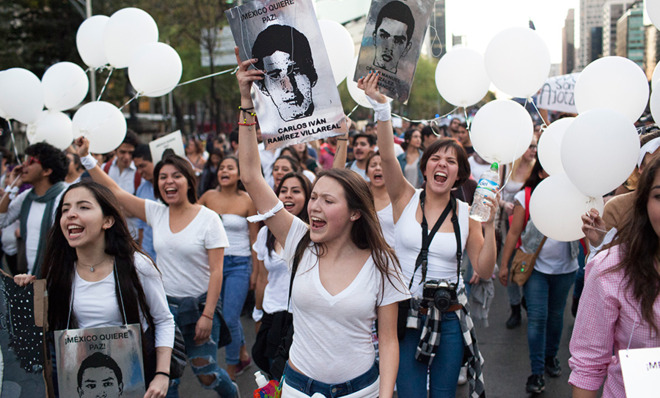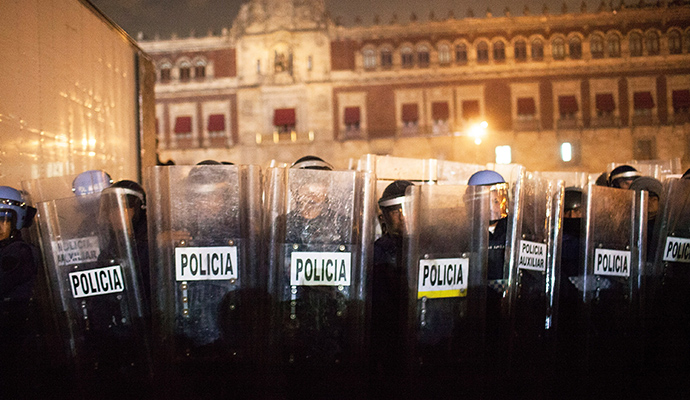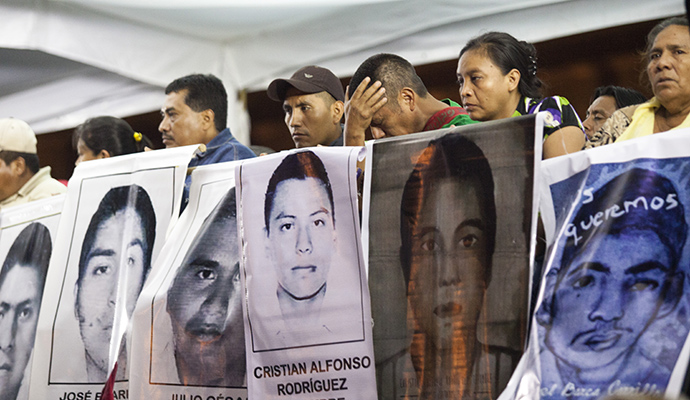Why America is to blame for Mexico's carnage and corruption
The U.S. has balked at publicly condemning corruption or human rights violations during Peña Nieto's administration

A free daily email with the biggest news stories of the day – and the best features from TheWeek.com
You are now subscribed
Your newsletter sign-up was successful

Mexican protesters are not burning American flags, but they may be soon if the United States doesn't change its approach to its southern neighbor. Whether they will admit it or not, President Barack Obama and the United States Congress are directly responsible for the tragedy of the 43 missing, and likely massacred, student activists in the Mexican state of Guerrero — and for the political crisis that has followed.
Enormous protests since Sept. 26, the day the students disappeared, have already forced the arrest of the mayor of the city of Iguala, where the incident took place, as well as the resignation of the governor of the state of Guerrero. Hundreds of thousands of Mexicans are now demanding the resignation of President Enrique Peña Nieto himself. On Nov. 20, the 104th anniversary of the Mexican Revolution, tens of thousands of protesters burned an enormous effigy of the president in Mexico City's central Zócalo square while chanting "Peña out!"
The hashtag #YaMeCansé, which translates roughly as "I am sick and tired" and is directed towards Peña Nieto's government, has been tweeted over 146 million times over the last two weeks. The classmates of the missing students have issued an ultimatum for the president to step down on Dec. 1 if he is unable to find the students before then.
The Week
Escape your echo chamber. Get the facts behind the news, plus analysis from multiple perspectives.

Sign up for The Week's Free Newsletters
From our morning news briefing to a weekly Good News Newsletter, get the best of The Week delivered directly to your inbox.
From our morning news briefing to a weekly Good News Newsletter, get the best of The Week delivered directly to your inbox.
Obama's Nov. 20 executive order deferring the deportation of millions of immigrants may allow the president a brief honeymoon with some of the millions of Mexicans with families or relatives in the United States. But this limited gesture is by no means enough to compensate for the enormous damage that the present administration has done to Mexico and the Mexican people. The U.S. government's blind support for Peña Nieto has helped create the context of absolute impunity in which forced disappearances, or massacres, like the one in Iguala are possible.
Obama has been one of Peña Nieto's staunchest defenders from the very beginning. Even before the contentious 2012 Mexican presidential election was settled, the U.S. president irresponsibly offered Peña Nieto congratulations on his victory. But since he took power on Dec. 1, 2012, the Mexican government's law enforcement record has been abominable.
(More from Foreign Policy: Why Chuck Hagel failed as SecDef)
Mexican authorities investigate only 6.2 percent of all crimes. Crime has increased overall, and the number of kidnappings and "disappeared" persons has risen sharply. Homicides remain at a historically unprecedented level, with almost 23,000 murders in 2013.
A free daily email with the biggest news stories of the day – and the best features from TheWeek.com
But the most worrisome turn of events has been the sharp uptick in human rights violations and attacks on the press. Human Rights Watch, Article 19, as well as numerous local NGOs have documented how both freedom of speech and freedom to protest have come under heavy fire since Peña Nieto took office. Indeed, during the Nov. 20 protests in Mexico City, 11 students were detained by police, then arbitrarily accused of terrorism, organized crime, and treason by Peña Nieto's attorney general and immediately sent to maximum-security federal prisons far from the capital — as if they were dangerous drug cartel leaders. Meanwhile, although the mayor of Iguala has been arrested, the chief of police of the city is still free and on the run two months after allegedly orchestrating the crime against the students.

Amid worsening conditions in Mexico, U.S. authorities have balked at publicly condemning corruption or human rights violations during Peña Nieto's administration. Indeed, Obama has ended each of his numerous personal encounters with Peña Nieto over the last two years with vigorous backslaps and expressions of admiration for his "amigo." When Peña Nieto made the mistake of traveling to China and Australia to participate in the recent Asia-Pacific Economic Cooperation and G-20 summits in the middle of the present crisis, Obama welcomed him with open arms and chose to plant trees side by side with him at China's Yanqi Lake. Indeed, viewed from Mexico, the sight of Obama and Peña Nieto shoveling dirt side by side gave the impression that they were working together to fill in the numerous mass graves that have been discovered around Iguala in recent days.
The State Department frequently issues travel advisories towards Mexico and spokeswoman Jen Psaki recently made passing bureaucratic remarks about the missing students, emphasizing the need to "remain calm" and bring the perpetrators to "justice." But no ranking official in the Obama administration or leading member of Congress has dared to call Peña Nieto to account for his responsibility with regard to the Sept. 26 murders and disappearances.
And the complicity of the U.S. government with the crisis of violence, corruption, and human rights abuses in Mexico goes far beyond backslapping and tree-planting. The United States has funneled at least $3 billion in assistance to Mexico over the last six years, in addition to enormous amounts of secret spending in direct military and security support. U.S. agents directly participate in the Mexican drug war. Numerous "fusion centers" exist throughout Mexico for directly sharing intelligence. American drones constantly fly over Mexican territory. Last year, the Obama administration ordered the website host GoDaddy to close down a leading Mexican opposition website in response to a groundless complaint from the Mexican government. And the Wall Street Journal has just revealed that U.S. agents dress up in Mexican military uniforms to participate directly in special missions.
Washington and Mexico City justify such profound U.S. involvement in Mexico's internal crime-fighting by saying that Peña Nieto's government needs all the support it can get in order to put down powerful drug cartels and reform the local police. But the Iguala case changes the narrative entirely.
According to the official account, the students were murdered in order to prevent them from interrupting a speech by María de los Ángeles Pineda, the wife of Iguala's mayor, José Luis Abarca. First, local police detained the students. Then they passed them off to members of a local drug cartel, who apparently burned them for 12 hours in an enormous bonfire in order to cover up evidence of the murder. The students were peaceful, unarmed, and have no relation to any drug cartels.
(More from Foreign Policy: The firestarter of Berlin)
Although this story has deflected attention toward local authorities, it actually reveals extensive federal complicity with the crime. According to Mexican law, the federal government is responsible for preventing, investigating, and punishing perpetrators of organized crime and drug trafficking, regardless of whether the criminals are acting independently or are affiliated with municipal, state, or federal authorities. Only active complicity by federal authorities could have allowed the Iguala mayor and his wife to get so close to the cartels that they had the power to order this monstrous attack on innocent students. Indeed, Abarca is accused of assassinating two local activists a year and a half ago and his wife is allegedly the sister of an important leader of a local drug cartel. If federal authorities had taken their duties seriously, they would have prosecuted the criminals running Iguala and thereby prevented the Sept. 26 murder.

But the federal government's failure is even more immediate. The Mexican military has a base, for the 27th Infantry Battalion, stationed in Iguala less than 100 meters from where the students were shot at and kidnapped. Indeed, there has been constant military presence in Guerrero for decades, especially since the anti-guerrilla "dirty wars" of the 1970s. The commander of the 27th battalion personally attended María de los Ángeles Pineda's speech on the night of Sept. 26, but apparently didn't notice anything out of the ordinary taking place that evening. Neither he nor his soldiers did anything to intervene during the more than three hours of shooting and 12 hours of burning flesh.
For years, law enforcement in Guerrero has been run by an alliance between municipal, state, and federal authorities. Indeed, as Guardian reporter Jo Tuckman has pointed out, the day before the massacre The Washington Post published an interview with Peña Nieto in which he bragged that "federal and local governments are no longer competing against each other, but are working in tandem to fight crime." In other words, the president himself admitted that the federal government works closely with local police forces.
Peña Nieto's erratic response to the massacre has all of the signs of a cover-up. Like the military on the night of the massacre and President Obama today, Peña Nieto first stood by and played politics by claiming that the students' disappearance was a strictly local issue for which the governor of Guerrero "should take responsibility." This was politically convenient for the president, since it allowed him to shift the blame to the opposition Party of the Democratic Revolution (PRD), which controls both Iguala and the state of Guerrero. Peña Nieto's attorney general, Jesús Murillo Karam, took 10 days before formally opening an investigation into the case. Since then, the federal government has refused to investigate the role of the military in the students' disappearance.
The federal government's response could be attributed to something akin to criminal incompetence — but only by those with a short memory. This is the second time Mexico has faced a mass murder and government cover-up in just five months. On June 30, the military massacred 22 young people during a botched raid. For three months afterward, federal authorities covered up the murders by falsely claiming that they had occurred in a shootout, until an Associated Press investigation and local witness accounts forced the government to bring charges against the soldiers. The military has still refused to accept responsibility for the massacre. The secretary of defense, Salvador Cienfuegos Zepeda, has publicly stated that the army will not be "intimidated" by these "erroneous" and "unjust" charges. When a U.S. State Department spokesperson was asked about the massacre, he began his statement saying, "So we are committed partners of Mexico in the fight against transnational organized crime," before referring the reporter back to the Mexican government.
(More from Foreign Policy: Dis town)
And now, with the Iguala massacre, the military is apparently once again determined to avoid being placed under investigation. If the U.S. government continues to play along with Peña Nieto's cover-up, the unprecedented legacy of impunity could be so large that neither Mexico City nor Washington may be able to recover from the crisis for years.